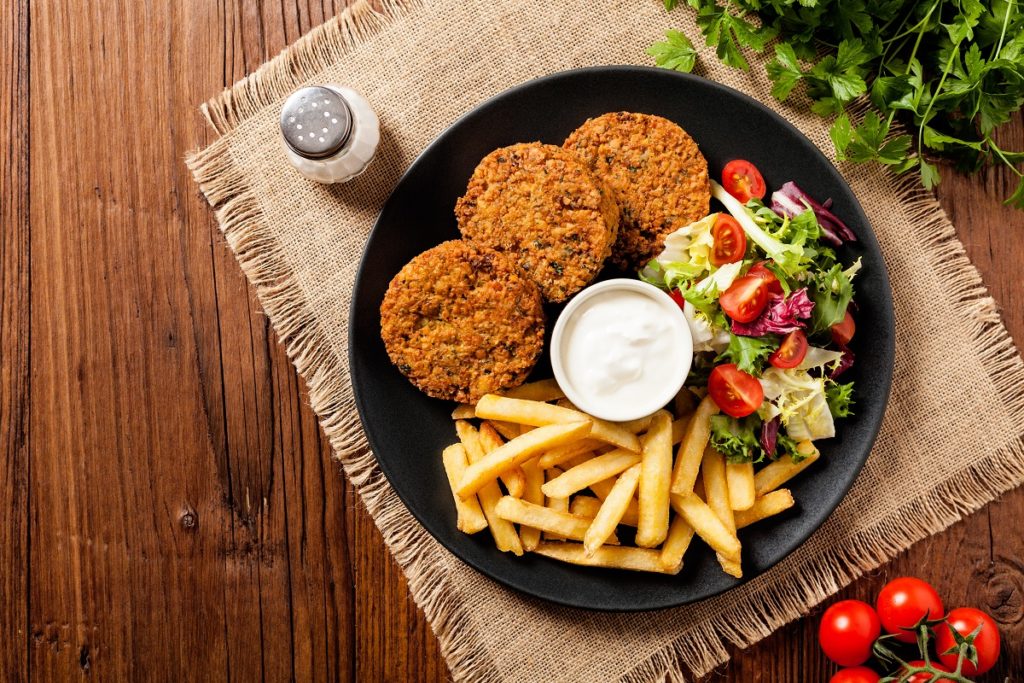As the interest in plant-based diets continues to grow, so too does the availability of vegan alternatives to traditional meat products. A prime example is vegan chicken, a product that has captured the attention of vegans, vegetarians, and even meat-eaters with its uncanny similarity to the real thing. But what is vegan chicken made of? How does it achieve that chicken-like texture and flavor without any actual chicken involved?
What Is Vegan Chicken?
Vegan chicken is a plant-based alternative to traditional chicken meat, designed to mimic the taste, texture, and nutritional profile of poultry. The objective of creating vegan chicken is not just to cater to vegetarians and vegans but also to offer an option for those who are looking to reduce their meat intake.
The main ingredients used to craft these chicken substitutes vary depending on the brand and product. However, the most commonly used base for vegan chicken is textured vegetable protein (TVP), soy protein, or wheat protein (also known as seitan). These sources of plant protein are manipulated to achieve a texture similar to that of chicken meat.
To impart the flavor, vegan chicken products often employ a mix of herbs, spices, and other plant-derived ingredients. Some brands also use specific techniques to replicate the unique flavor of chicken, such as fermentation or the use of yeast extracts.
It’s important to note that while these products aim to mimic the look, taste, and texture of chicken, they do not replicate the exact nutritional profile of chicken meat. However, many vegan chicken alternatives are fortified to provide a comparable amount of protein and essential nutrients.
What Is Vegan Chicken Made Of?
The creation of vegan chicken is a culinary adventure, primarily hinging on plant-based protein sources and a mix of unique ingredients to replicate the taste and texture of poultry. Depending on the brand, the constituents of vegan chicken can vary, but here are some of the most common ingredients you’ll find in your vegan chicken:
- Textured Vegetable Protein (TVP): This is often the main ingredient in many vegan chicken options. Derived from soy flour, TVP provides a meaty texture required to mimic real chicken.
- Soy Protein: Like TVP, soy protein offers a texture closely comparable to meat. It is often used in tofu and tempeh, which can be seasoned and prepared to mimic the taste of chicken.
- Wheat Protein (Seitan): Another popular base for vegan chicken, seitan is made with wheat flour dough. It is first washed with water to remove all the starch granules in it. The gluten mass left behind is then cooked for consumption.
- Herbs and Spices: To achieve chicken-like flavors, a combination of herbs, spices, and other plant-based ingredients are used. Garlic, onion, paprika, and yeast extract are commonly used to impart a savory taste.
- Yeast Extracts or Fermented Ingredients: Certain brands also use yeast extracts or fermented ingredients to give vegan chicken a unique savory, umami flavor.
- Nutritional Fortification: Some vegan chicken products are fortified with nutrients like vitamin B12, iron, and zinc, which are typically found in real chicken but may not be naturally present in plant-based ingredients.
Remember, the specific composition of vegan chicken can greatly vary from one brand to another. Always check the product’s nutritional label to understand the exact ingredients and nutritional profile.
How Is Vegan Chicken Made?
The process of making vegan chicken is fascinating and involves using plant-based ingredients to recreate the texture, taste, and nutritional value of real chicken. While the exact procedure might vary depending on the brand and specific product, the general steps are as follows:
- Selection of Protein Source: The first step is choosing the main protein source that will serve as the base of the vegan chicken. This could be Textured Vegetable Protein (TVP), soy protein, or wheat protein (seitan).
- Manipulation of Texture: Once the protein source is chosen, it is then manipulated to achieve a texture similar to that of chicken meat. For example, when making seitan, wheat flour dough is washed with water until all the starch granules have been removed, leaving the sticky insoluble gluten as an elastic mass.
- Flavoring: After achieving the desired texture, the next step is flavoring. This is done by adding a combination of herbs, spices, and other plant-based ingredients such as garlic, onion, paprika, and yeast extract.
- Cooking Process: The vegan chicken is then cooked, often by baking, steaming, or boiling. The cooking process helps to further develop the flavors and texture of the vegan chicken.
- Nutritional Fortification: Lastly, some brands choose to fortify their vegan chicken products with essential nutrients like vitamin B12, iron, and zinc. This step ensures that the vegan chicken product provides a similar nutritional profile to real chicken.
Remember, the process of making vegan chicken is a science and an art, and manufacturers often have their unique methods and secret ingredients to make their vegan chicken stand out.
Nutritional Benefits of Vegan Chicken
While vegan chicken may not entirely mimic the nutritional profile of real poultry, it does offer its own set of nutritional benefits and advantages that make it a worthy alternative for those looking to cut back or completely eliminate meat from their diet.
Vegan Chicken vs Real Chicken
When it comes to protein content, real chicken generally has a higher amount compared to most vegan chicken alternatives. However, many vegan chicken products are fortified and can still offer a substantial amount of protein.
Moreover, vegan chicken, particularly those based on soy or wheat protein, can provide fiber—something real chicken does not contain. Vegan chicken also tends to be lower in fat, specifically saturated fat, and is entirely free from cholesterol, making it potentially a healthier choice for those managing their heart health.
Health Benefits
Aside from the nutritional aspects, the health benefits of vegan chicken are noteworthy. High in fiber and low in saturated fat and cholesterol, vegan chicken supports heart health and promotes better digestion.
Additionally, it can contribute to a more diverse diet by introducing plant-based nutrients that you may not typically get from a meat-centric meal, such as certain phytonutrients found in soy. By choosing vegan chicken, you’re also avoiding potential health risks associated with consuming real chicken, such as exposure to antibiotics and hormones often used in poultry farming. Overall, vegan chicken can be a crucial part of a balanced, plant-focused diet that supports overall health and well-being.
Is Vegan Chicken Healthier?
Whether vegan chicken is healthier than real chicken depends on various factors, including personal dietary needs, overall eating habits, and specific health goals. From a purely nutritional standpoint, vegan chicken can be considered healthier in some aspects.
For instance, vegan chicken is often lower in fat, specifically saturated fat, and completely devoid of cholesterol. These attributes make it a heart-healthy alternative to real chicken, especially for those managing cholesterol levels or heart health.
The high fiber content found in plant-based chicken alternatives also sets it apart from real poultry, which contains no fiber. Regular fiber intake is critical for maintaining digestive health, regulating blood sugar levels, and aiding in weight management.
However, real chicken has its merits—namely, a higher protein content and a broader range of essential nutrients like vitamin B6 and selenium. While many vegan chicken products are fortified to compensate for these nutrients, some people may still prefer the nutritional profile of real chicken.
Vegan chicken also shines in terms of environmental and ethical considerations. Choosing plant-based alternatives helps reduce the demand for factory farming, which is known for its negative environmental impacts and often questionable animal welfare practices.
That said, it’s essential to note that not all vegan chicken products are created equal. Some can be highly processed and contain artificial additives, excessive sodium, or unhealthy fats.
Therefore, it’s important to consider the overall quality and nutritional profile of the vegan chicken product rather than just the fact that it’s plant-based. Reading labels and choosing products with minimal processed ingredients can help ensure you’re making a healthful choice.
How to Cook Vegan Chicken
Cooking vegan chicken isn’t too different from cooking real chicken. Thanks to the texture and flavor of the vegan substitute, you can use it in essentially any recipe that calls for chicken. However, it’s always important to follow the cooking instructions on the packaging, as different products can have different cooking times and methods. Here are some recipe ideas featuring vegan chicken to inspire you.
Recipe Ideas
From stir-fries and curries to sandwiches and salads, you can incorporate vegan chicken into numerous dishes. Here are some suggestions:
- Vegan Chicken Stir-Fry: Stir fry your vegan chicken with a medley of colorful vegetables and your favorite sauce. Serve it over rice or noodles for a quick, hearty meal.
- Vegan Chicken Curry: Simmer vegan chicken pieces in a flavorful curry sauce. Pair it with rice or flatbread for a comforting dinner.
- Vegan Chicken Sandwich: Layer slices of vegan chicken with lettuce, tomatoes, and vegan mayo between two slices of your favorite bread for an easy, satisfying lunch.
- Vegan Chicken Salad: Toss vegan chicken strips with fresh salad greens, cherry tomatoes, cucumbers, and your preferred dressing for a light, nutritious meal.
Experiment with different recipes, sauces, and seasonings to discover your favorite way to enjoy vegan chicken. The possibilities are virtually endless!
Why Choose Plant-Based Chicken?
Choosing plant-based or vegan chicken over traditional poultry offers several advantages that can impact personal health, animal welfare, and environmental sustainability. Here are some compelling reasons to consider making the switch:
- Health Benefits: Vegan chicken, particularly those made with soy or wheat protein, is high in fiber, which supports digestive health and can help regulate blood sugar levels. It’s also virtually free of cholesterol and typically lower in saturated fat, making it a heart-healthy choice.
- Animal Welfare: Opting for plant-based alternatives reduces the demand for animal-based products, which is a direct way to contribute to animal welfare. Several farming practices in the poultry industry raise ethical concerns, and choosing vegan alternatives is a step towards more humane practices.
- Environmental Impact: Animal agriculture is a significant contributor to greenhouse gas emissions, deforestation, and water pollution. Choosing plant-based alternatives like vegan chicken reduces the demand for these practices, thus helping mitigate environmental damage.
- Nutritional Variety: Vegan chicken introduces plant-based nutrients that are not typically found in a meat-centric diet, contributing to dietary diversity. Some brands fortify their products with vitamins and minerals, ensuring a comparable nutritional profile to real chicken.
- Culinary Exploration: The taste and texture of vegan chicken open up a new world of culinary possibilities. You can explore different flavors and recipes, making it an exciting addition to your meals.
Remember, it’s always crucial to check the ingredients list and nutritional facts when choosing vegan chicken products. Opt for those with minimal processed ingredients and added sugars and enjoy the benefits of a well-rounded plant-based diet.
Vegan Chicken Substitutes
While there are many pre-packaged vegan chicken products available in the market, some may prefer making their vegan chicken substitutes at home. Here are some simple and versatile options:
- Tofu: This soy-based product can be marinated and baked, grilled, or sautéed to achieve a meat-like texture and flavor. It’s a good source of protein and can absorb a variety of flavors well.
- Tempeh: Made from fermented soybeans, tempeh has a firm texture and earthy flavor. It’s high in protein and fiber and can be used in a variety of dishes.
- Seitan: Also known as wheat meat, seitan has a chewy texture that’s somewhat similar to chicken. It is high in protein and can be flavored to mimic chicken.
- Jackfruit: This tropical fruit has a fibrous texture that can resemble shredded chicken when cooked. It’s a great source of fiber and can be used in a variety of dishes, from tacos to stir-fries.
- Mushrooms: Certain varieties like oyster or shiitake mushrooms offer a meaty texture and umami flavor that can work well as chicken substitutes in various dishes.
Remember, the key to a satisfying vegan chicken substitute is in the seasoning. Using herbs, spices, and sauces can help to replicate the savory flavor typically associated with chicken.
Conclusion
Vegan chicken offers a viable and nutritious alternative to traditional poultry, providing benefits for health, animal welfare, and environmental sustainability. It’s important to select high-quality products with minimal processed ingredients and to incorporate a variety of plant-based proteins into your diet for optimal nutrition. Whether you’re a committed vegan, a flexitarian, or just someone looking to diversify your meal options, exploring the world of vegan chicken can lead to a healthier and more sustainable diet.
FAQs
Is vegan chicken vegetarian or non-vegetarian?
Vegan chicken is vegetarian. It’s made from plant-based sources like soy, wheat protein, or pea protein and contains no animal products or byproducts.
Does vegan chicken taste like chicken?
Vegan chicken is designed to mimic the texture and flavor of real chicken. However, the taste may vary depending on the brand and how it’s prepared.
Is vegan chicken more expensive?
The price of vegan chicken can vary. Some products may be more expensive than real chicken, while others are priced comparably.
Why is vegan better than meat?
Vegan diets can support health, animal welfare, and environmental sustainability. They’re rich in fiber and plant-based nutrients and free from cholesterol and factory farming practices.



